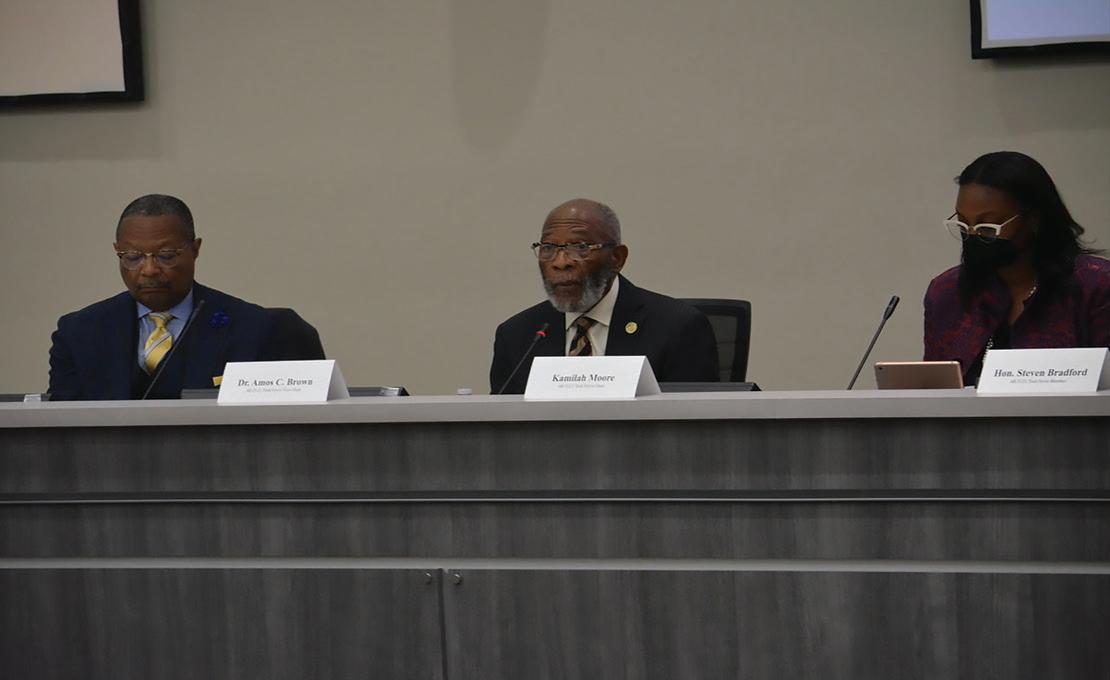
9 minute read
Women’s History Month: Meet the Black Women Legislators Shaping California Policy
Mark Hedin | California Black Media
Since Yvonne Braithwaite Burke became the first Black woman elected to serve in the California State Assembly in 1966, 20 other African women have represented their constituents in both houses of the California State Legislature with distinction. Many of them have gone on to make their marks in various political arenas at the state, local and national levels.
Advertisement
Take U.S. Congresswoman Barbara Lee (D-CA-12), who represented Oakland and adjacent communities in the State Assembly and Senate for eight years before winning the first of 13 terms she has now served in the U.S. House of Representatives.
Or Los Angeles mayor Karen Bass, also a California Assembly alumna, who became Speaker of the body in 2008. and served six terms in the U.S. Congress. Or U.S. Congresswoman Maxine Waters (D-CA-29) represented South LA in the Assembly is serving her 17th term in the U.S. Congress.
Other Black alumnae of the California Assembly and Senate are: California Secretary of State Shirley N. Weber (20122021, Assembly); Theresa P. Hughes (1975-1992, Assembly, and 1992-2000, Senate); Gwen Moore (1978-1994, Assembly); former U.S. Congressmember Diane E. Watson (1978-1998, Assembly); Marguerite ArchieHudson (1990-1996, Assembly); former U.S. Congressmember Juanita Millender-McDonald (1992-1996, Assembly); former U.S. Congressmember Laura Richardson (2006-2007, Assembly); Wilmer Amina Carter (2006-2012, Assembly); California State Commissioner on Aging Cheryl Brown (20122016, Assembly); Los Angeles County Supervisor Holly J. Mitchell (2010-2013, Assembly, and 2013-2020, Senate), Autumn Burke (2014-2022, Assembly), and U.S. Congressmember Syndey Kamlager ( 2018-2021 Assembly, 2021-2022, Senate).
In 2023, five of the California’s Black Legislative Caucus’ (CBLC) 12 members are women. They are:
Lola Smallwood-Cuevas (D –Ladera Heights) The only Black woman in the California State Senate, Lola Smallwood-Cuevas represents state Senate District 28, a small, densely populated section of Los Angeles County that includes Culver City and parts of mid-city Los Angeles and unincorporated Los Angeles County.
She began her career as a journalist in Oakland, Chicago and Long Beach, where she became active as a newspaper union organizer before joining the labor movement on a broader scale, starting with the SEIU.
She worked in the successful Justice for Janitors campaign of the 1990s, and during 15 years working at UCLA, she founded the Center for Advancement of Racial Equity at Work and cofounded the Los Angeles Black Worker Center, which became a model for similar organizations across the country, recognized by President Barack Obama.
In her first months as a state senator, Smallwood-Cuevas has introduced a package of worker and civil rights measures. Among them is SB 627, legislation that would help workers laid off by a chain business to find work at other locations nearby. Another, SB 497, would offer workers whistleblower protection in cases of alleged wage theft or unequal pay.
Lori Wilson (D – Suisun City)
When she was elected mayor of Suisun City in 2018, Lori Wilson became the first-ever Black woman to serve as mayor anywhere in Solano County. She’d been vice-mayor for six years.
Now, she’s chair of the CBLC after her election in April last year to represent the 11th Assembly district, which straddles Solano and Contra Costa counties.
She earned a degree from CSU Sacramento in Business Administration and in a 20-year career in finance and accounting worked with homebuilders, fair housing agencies and as Solano County’s auditor. In Suisun City, she brought these skills to bear in helping house fire refugees and addressing COVID challenges.
She serves on the
Appropriations, Banking and Finance, and the Accountability and Administrative Review standing committees.
Akilah Weber (D – San Diego)
From the 79th Assembly district is Akilah Weber, representing parts of San Diego, her hometown, and El Cajon, Lemon Grove, Spring Valley/La Presa and La Mesa.
After becoming first Black person ever elected to the La Mesa city council in 2018, Weber left in early 2021 to run for the Assembly seat in a special election to replace her mother, Dr. Shirley Weber, who’d been named secretary of state. She won, and her mother swore her in. Akilah Weber was re-elected in 2022.
Weber is a doctor who founded San Diego’s Rady Children’s Hospital Pediatric & Adolescent Gynecology Division, heads the adolescent gynecology program at UC San Diego Health, and is an assistant clinical professor at UCSD.
Looking back at her time on the La Mesa City Council, she told the San Diego Union Tribune her “most important vote” had been to form the city’s Community Police Oversight Board. She also supported creating its homelessness task force and implementing its Climate Action Plan.
In the state Assembly, she serves on six standing committees: Health, Higher Education Appropriations, Communications and Conveyance, and Water, Parks and Wildlife, Legislative Ethics Committee (co-chair) and Social Determinants of Health select committee (chair).
Tina McKinnor (D –Inglewood) Tina McKinnor’s 61st Assembly district spans communities in western Los Angeles County including
California lifts target for 15% water conservation as yet another storm approaches...continued said California must not relax its ethos of water conservation.
Inglewood, Gardena, Hawthorne, Marina del Rey, Venice, Westchester, Westmont, West Athens and parts of Los Angeles. She was elected to the state Assembly in July last year in a special election after the sudden resignation of Autumn Burke, herself a former CBLC vice-chair and the daughter of California Assembly alum and three-term U.S. Congresswoman Yvonne Brathwaite Burke. Burke cited COVID impacts on her family at the time for her resignation.
McKinnor, who had worked in the Assembly for years as Burke’s chief of staff, is now chair of the Assembly’s Public Employment and Retirement Committee, chair of the Los Angeles 2028 Olympic and Paralympic Games Select Committee, and a member of the Business and Professions and the Environmental Safety and Toxic Materials committees.
Before serving in the Assembly, McKinnor worked for the nonprofit LAVoice developing affordable housing in coordination with faith-based organizations.
McKinnor has also been active in advancing reproductive rights, health care and police reforms.
Mia Bonta (D – Oakland) Mia Bonta ran for and won the 18th Assembly district seat in Alameda County in a 2021 special election called atter her husband, Rob Bonta, who’d held the seat since 2012, was named California Attorney General.
Bonta describes herself as a “proud Black Latina, raised by activists who protested outside the halls of power so that people like her could one day have a seat at the table inside.”
She earned her law degree at Yale, after studying there as an undergraduate. She earned her Ed.M from the Harvard Graduate School of Education.
Prior to being elected to the state Assembly, Bonta work revolved around improving educational outcomes for lowincome students as CEO of Oakland Promise, a district-wide Oakland college and career prep program, and board president of the Alameda Unified School District.
She serves on six Assembly committees: Joint Legislative Budget, Public Safety, Human Services, Communications and Conveyance, Business and Professions and the Budget Committee, including two of its subcommittees No. 5 -- Public Safety -- and No. 6 -- Budget Process, Oversight and Program Evaluation.
California lifts target for 15% water conservation as yet another storm approaches
BY ALASTAIR BLAND
down sidewalks and watering ornamental grass on commercial property, remain banned, according to state officials.
The state, however, is ending its requirement that local water agencies implement Level 2 drought contingency plans, which are locally written water use regulations— such as limits on watering lawns — that are invoked during water shortages.
In spite of wet weather, the state’s largest water supply — its groundwater basins — remain depleted.
“Even though reservoirs are recovering, groundwater aquifers remain depleted. The Colorado River — a major water source for Southern California — is also facing a massive deficit,” Cooley said. “The reality is we don’t have water to waste in California. We need to continue investing in water efficiency to prepare for a hotter, drier future and more intense droughts.”
Mike McNutt, spokesperson for the Las Virgenes Municipal Water District in Los Angeles County, said the retraction of the conservation target “sends the wrong message” to the public.
“Why put out messaging that says something different, that says, ‘You can conserve if you want to, but you don’t need to’?” said McNutt, whose district serving 75,000 people is totally reliant on water from the state aqueduct.
“The next drought is certainly just around the corner,” he added.
Californians did cut their average water use by 600,000 acre-feet in almost two years. That’s almost two-thirds the volume of Folsom Reservoir and enough water to serve 1.2 million households in a year.
Crowfoot stressed that the drought is not over, noting that drought status “is not a completely binary situation.” In some parts of the state, drought conditions have dramatically eased, but not in others. Crowfoot said the Klamath River basin and the region of Southern California that relies on Colorado River water continue to face “acute water shortages.”
Thousands of households lack drinking water due to depleted groundwater basins , which have been overdrafted for decades and experts agree they will not rebound in a single rainy winter.
Joaquin Esquivel, chair of the State Water Resources Control Board, said the hope is that cities “are not just rebounding” to old ways of water use.
“Conservation remains a priority,” Crowfoot added.
Michael Anderson, a climatologist with the California Department of Water Resources, said snowpack is at 278% of
Sprinklers water a lawn in Los Angeles on June 5, 2022. Photo by Pablo Unzueta,

CalMatters
With the Sierra Nevada smothered in snow, large swaths of the Central Valley underwater and many Californians weary of water, state officials announced today that they are lifting some drought-related provisions on water use.
“Our water supply conditions have improved markedly,” said Secretary of Natural Resources Wade Crowfoot.
The state is rescinding its request for voluntary 15% water conservation statewide, which was issued in July 2021, and instead, Crowfoot said, shifting to an approach of making conservation a “way of life.”
“We need to maintain our vigilance,” he said. “It’s not about going back to normal anymore. It’s really adjusting to a new normal.”
Some of the state’s emergency provisions were ended and some were left in place. Wasteful uses of water, such as hosing
In total, 81 drought-related provisions were enacted since April 2021. Just 33 remain in place, said Gov. Gavin Newsom at a press briefing today.
State officials also announced today a large increase in the amounts of water that local suppliers will get from the State Water Project, increasing from 35% announced last month to 75% of requested supplies. The water is provided to 750,000 acres of farmland and 27 million people, mostly in Southern California.
The announcements come as some of the state’s reservoirs near capacity, with some of the state’s largest expected to fill by late spring. And the snowpack of the Sierra Nevada, nearing record levels in the southern portion of the range, continues to grow.
When Newsom issued his voluntary conservation target almost two years ago, many water experts said Newsom should have made it mandatory, as former Gov. Jerry Brown did during the previous drought. They also criticized him for failing to reduce use by farmers, who consume 80% of the state’s delivered water supply.
State officials say even though the 15% target was voluntary, it worked. However, the data does not back that up: Californians used 6% less water from July 2021 through December 2022 compared to 2020 — falling far short of Newsom’s 15% goal.
Heather Cooley, director of research at the Pacific Institute, an Oakland water supply thinktank, normal, with another storm system expected to hit the North Coast and move inland and south from there, starting Monday. The system, he said, will deliver a relatively cold storm originating in the Gulf of Alaska, unlike some recent blasts of tropical moisture. This means it will drop more snow in the mountains.
“Not massive accumulations, but could be locally heavy,” he said.
Newsom Outlines Vision for California, Pledging to Permanently Eradicate Homelessness

The governor has also laid out ambitious plans to manufacture insulin, control substance abuse, and shut down private prisons.
By Sunita Sohrabji
California Governor Gavin Newsom laid out his vision for California at a March 22 press briefing with ethnic media, and pledged to permanently eradicate homelessness.
Fresh off his four day “state of the state” tour, his alternative to the traditional annual address to the state Legislature, Newsom announced the release of $1 billion in Homeless Housing, Assistance and Prevention Round 4 funding, which will be doled out to cities and counties attempting to reduce their unhoused populations. The $1
Incorporating Feedback from Inland Empire Small Business Owners, Majority Leader Reyes Announces Bill to Increase Access to State Resources
Reyes’s survey respondents shared their need for a way to find grants, technical assistance, tax incentives and other financial opportunities.
(SACRAMENTO) —
On February 27, Assembly
Majority Leader Reyes issued a survey to small businesses across the Inland Empire and beyond, asking for feedback on their needs. Thanks to their feedback, Reyes is announcing new legislation, AB 258, which would create a state-administered small business portal. The portal would create a place for small business owners to search for opportunities such as technical assistance, grants, tax credits and incentives, and information on regulation compliance. It would also include a simple way for state agencies to find and partner with state-certified small businesses, with an emphasis on ones owned by veterans, women, and minorities.
“Thank you to the small business owners who provided their insight into the assistance that would best support their work,” said Reyes. “The long term success of California relies on small businesses. I am proud to introduce this bill because I know it reflects the needs of Inland Empire small businesses and will also benefit the entire state.”
The legislation is likely to receive its first vote in April.






